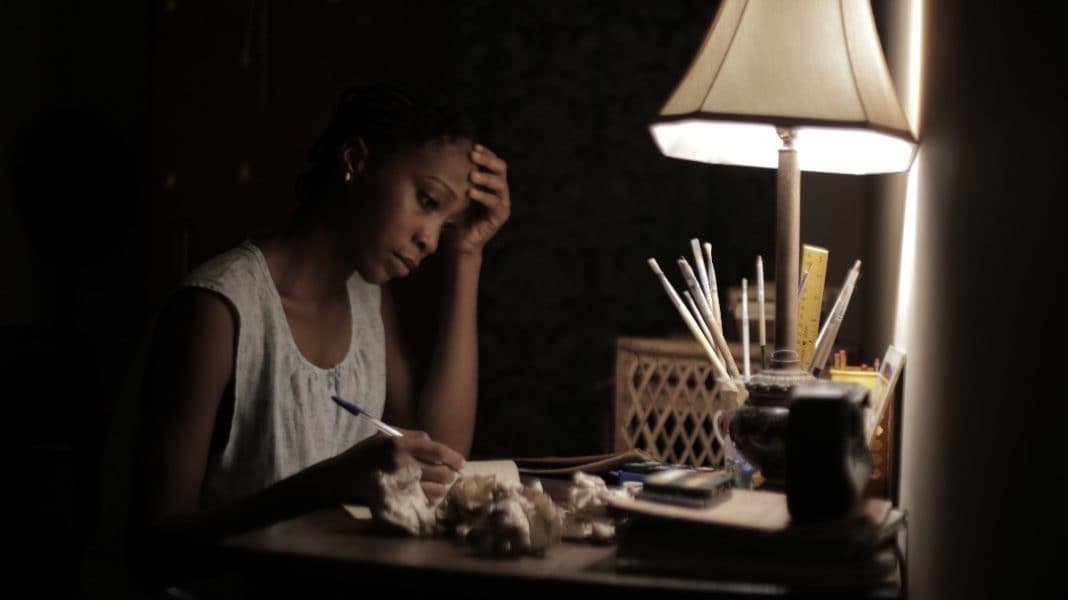The golden age of the Nigerian short film
Nigerian filmmakers are embracing the short form as more than just a cinematic calling card.

A still from "Gone Nine Months."
We are presently experiencing something of a golden age of Nigerian short films. From Iquo B. Essien’s moving, impassioned Aissa’s Story (2013), which was an official selection of the 2015 edition of the prestigious Pan-African Film and Television Festival of Ouagadougou (FESPACO), to the marvelously quirky work of Abba T. Makama, whose hilarious Direc-toh (2010) was screened at the Eko International Film Festival in 2011, Nigerian filmmakers are embracing the short form as more than just a cinematic calling card. Both Essien and Makama have made multiple shorts—Essien’s New York, I Love You (2016) screened to sold-out audiences at Lincoln Center and the Brooklyn Academy of Music, while Makama’s Quacks (2012) has been met with similar enthusiasm throughout West Africa and the diaspora. Their careers model a respect for the short film that is altogether inspiring, and they are but two examples of Nigerian artists successfully testing the boundaries of the form.
Another is Lola Okusami, who was born in the United States but raised in Nigeria. Okusami studied journalism at the University of Minnesota before beginning a career in print media, corporate communications, and television. She recently completed her first film, the impressive short Gone Nine Months (2017), which she shot in Calabar.
Set in 1993, in and around the fictional University of Southwestern Nigeria (modeled, perhaps, on Southwestern University, in Ikeja), Gone Nine Months depicts the experiences of two academics and their five children, all of them coping (albeit in vastly different ways) with the stresses of life under military rule. The matriarch, an accomplished geophysicist named Agnes (played by the talented, immensely appealing ’Najite Dede), is pursuing various postdoctoral fellowship opportunities in France and the United States (and has her heart set on the latter). The patriarch, the taciturn Tunde (Olu Euba), initially (if brusquely) claims that he supports his wife’s ambitions (“Whatever you want to do, do it!”), but later reveals that he does not, in fact, want Agnes to travel—much less to be abroad for as long as nine consecutive months. Tunde’s all-too-recognizable patriarchal conservatism is a key element of the film—the repressive fulcrum of its original plot.
The film opens with economical introductions to each of the couple’s five children. Ensconced in staff quarters on a quiet street near the university, the siblings await the arrival of their parents from what is later revealed to have been a tense “face-off” between members of the Academic Staff Union of Universities (ASUU) and the military government. The eldest of the siblings, Isha (Zoe Favour), sits reading This Is Our Chance: Plays from West Africa (1957), a major collection by the Nigerian playwright James Ene Henshaw, while the others (including Inimfon Iniama’s Oumou, who is close to Isha in age) enjoy a series of decidedly less intellectual pursuits. The film’s plot is set in motion by the delivery of a letter informing the hardworking Agnes that she has finally been offered a postdoctoral fellowship in France. (Tellingly, the children at first worry that the delivery is a “letter bomb” of the sort that terrorized journalists, academics, and political activists during the military dictatorship of General Sani Abacha.) When he returns home to news of his wife’s fellowship opportunity, Tunde seems more interested in watching the evening news, which is reporting on the standoff of which he himself has long been a part. (These interpolated television broadcasts—staged by Okusami—are impressive approximations of the era’s dominant televisual aesthetic, as well as a subtly effective means of evoking actual ASUU struggles, particularly the union’s efforts to protest the unjust dismissal of teachers by the Abacha regime.)
Much of what follows centers on the visa interviews for which Agnes so thoroughly and so hopefully prepares. The first interview, at the French embassy in Lagos, does not go well; Agnes is turned down. “They said I could not show sufficient proof that I would ever come back,” she says, in exhausted disbelief. Finally, Agnes is offered a fellowship at the American Institute of Geophysics, and the future looks bright—she promises to save much of her stipend for use on shoes, multicolored jeans, and other presents for her children—until the family receives some startling news about Oumou.
Gone Nine Months is a well-acted and beautifully shot film, full of details that powerfully evoke the precise historical moment of the early 1990s. Okusami, who left Nigeria in 1996, and says that she can “remember the early 90s as fraught with this air of desperation,” told me that she was interested in conveying this atmosphere—the product of a military government whose predations had led to seemingly constant university strikes, including those affecting the filmmaker’s parents, both of them lecturers. That Okusami manages to capture this panicked period in fewer than 22 minutes is altogether remarkable. The semiautobiographical Gone Nine Months gets at the generalized anxieties that came with military rule, showing how the traumas of Abacha’s regime reached into every corner of everyday life in Nigeria. This is a most welcome contribution to the golden age of the Nigerian short film.


